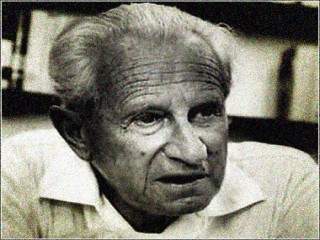
Herbert Marcuse biography
Date of birth : 1898-07-19
Date of death : 1979-07-29
Birthplace : Berlin, Germany
Nationality : German
Category : Science and Technology
Last modified : 2011-06-07
Credited as : Philosopher, and sociologist, Repressive Tolerance
Herbert Marcuse was born in Berlin on July 19, 1898. In 1922 he received his doctorate of philosophy from the universities of Berlin and Freiburg. Marcuse's distinctive intellectual heritage was based on the democratic and socialist philosophy originated by G. W. F. Hegel and developed by Karl Marx—combined with the psychoanalytic theories of Sigmund Freud. On this basis he took a stand against fascism, as it appeared in Europe from the 1920s until the end of World War II and as it appeared later in the allegedly fascist elements of advanced industrial society.
In 1934 Marcuse emigrated to the United States and joined the Institute of Social Research in New York City. In 1941 he became a U.S. citizen. Also in 1941 Marcuse published Reason and Revolution, a study of Hegel and the rise of social theory. Marcuse's intention was to draw a distinction between Hegel and the contemporary fascist interpretations of Hegel's theories.
During World War II Marcuse served in the OSS (Office of Strategic Services, which later became the Central Intelligence Agency [CIA]). He worked for the U.S. Department of State until 1950. For several years thereafter he was a member of the Russian Institutes of Columbia University and Harvard University. From 1954 to 1965 he was a professor at Brandeis University. He married Inge S. Werner in 1955.
Marcuse's Eros and Civilization (1955) presents a Neo-Freudian view of man. It argues for a greater tolerance of eroticism than that permitted by the status quo. The book argues that a tolerant attitude toward sexuality would lead to a more satisfactory life in a society devoid of aggression.
Because of this book Marcuse is considered one of the philosophers of the "sexual revolution."
Marcuse criticized the advanced industrial societies of the United States and the Soviet Union for constructing a civilization that requires ceaseless production and consumption of unnecessary goods and for perpetuating themselves at the expense not only of other nations but also of their own populations. In Soviet Marxism (1958) Marcuse views the Soviet Union as actually worse but potentially better than the United States.
One-Dimensional Man (1964) continues Marcuse's attack on advanced industrial society—especially that found in the United States. He writes that America's affluence is facilitated by self-serving technology—such as military defense—in which the only reason products are consumed is that they are available. As a result, humanity's authenticity is undermined, and its potential for aggression is elevated to the point at which nuclear holocaust is probable. One-Dimensional Manis a pessimistic work in which the United States emerges as the most dangerous nation on Earth. It was, however, an important work during the following decade of radical political change.
In 1965 Marcuse joined the faculty of the University of California in San Diego. That year his controversial essay "Repressive Tolerance" appeared. It states that the United States is repressive, since dissent goes unheard and no alternative to the view of the Establishment is considered. Accordingly, in defense of tolerance it is correct to disrupt and obstruct Establishment spokesmen. At this time Marcuse collaborated on A Critique of Pure Tolerance (1965).
College campus uprisings, culminating in the revolt of French students in May 1968, rendered Marcuse open to attack. In July 1968 he disappeared from his home in California after reportedly receiving a threatening letter from the Ku Klux Klan. In October 1968 a campaign was launched to dislodge him from his teaching position. And in 1969 Pope Paul criticized his views on sex.
An Essay on Liberation (1969), written before the French student rebellion, is dedicated to the student militants. Clearly, Marcuse hoped that they might effect the revolution he deemed justifiable against the oppressiveness and aggressiveness of contemporary industrial society. He published Five Lectures: Psychoanalysis, Politics, and Utopia in 1970.
In 1972 Marcuse published Studies in Critical Philosophy, a study of authority; From Luther to Popper; and Counterrevolution and Revolt. Then, in 1978, he focused again on Marx in The Aesthetic Dimension: Toward a Critique of Marxist Aesthetics.
Other articles and essays Marcuse wrote include: "Remarks on a Redefinition of Culture" Daedalus: Journal of the American Academy of Arts and Sciences (1965); Negations: Essays in Critical Theory" (1968); "Art and Revolution," Partisan Review (1972); "Marxism and Feminism," Women's Studies: An Interdisciplinary Journal (1974); "The Obsolescence of the Freudian Concept of Man" (published 1989); and "Philosophy and Critical Theory," Critical Theory and Society: A Reader (1989).
Shortly before his death in 1979, Marcuse reflected upon the inseparability of human beings and nature in "Ecology and the Critique of Modern Society," in which he stated that the natural environment must be shielded from capitalist—and Communist—destruction.
















